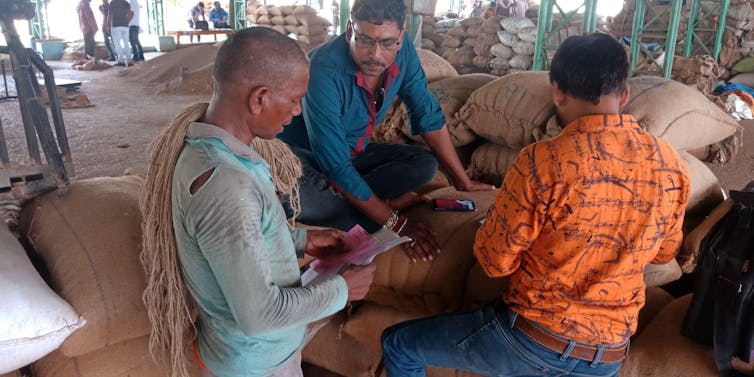By Bhavani Shankar
India’s farmers have been protesting since the autumn, with a growing intensity that culminated in a violent breaching of barriers in the Red Fort in Delhi during India’s Republic Day celebrations on January 26.
The protests were spurred by the passing of a set of agricultural reform bills in parliament in September 2020 that aimed to fundamentally transform the way in which farm produce is marketed in the country. India’s farming population of more than 100 million is comprised largely of small farmers who fear that the reforms will add considerable uncertainty to their already meagre livelihoods.

India has historically had a strongly regulated marketing system for agricultural produce, originally devised to enable farmers to sell to the market but at the same time to protect the small, often poor farmers from the vagaries of the open market.
Such regulation is a state-level responsibility in India’s federal governance structure. Accordingly, each state devised a system wherein the initial purchase and sale of agricultural products had to be conducted at state-regulated wholesale markets called mandis. These mandis had licensed middlemen and traders who could be regulated by the government to ensure that farmers were not exploited.
The broader legislative framework also acted to limit private sector storage of key food products (to prevent hoarding) and discourage direct contracting between private agribusiness and farmers. There were important variations in regulations across states, and legislation has changed over time, but the broad intention was to protect farmers by limiting the power of agribusiness.
However, the regulatory system did not always work as intended in practice, and deficiencies became apparent over time. Despite the idea of monitoring, traders and middlemen in wholesale markets were found to often collude to the disadvantage of the farmer. Pricing practices were opaque and farmers too often received a very low share of the price.
Variations in regulations across states also hindered interstate trade opportunities. As the Indian economy was liberalised, private enterprise and agribusiness was growing, but found itself shackled by the regulatory framework. Many commentators agreed that reform was needed.

Neeraj Chaturvedi/Alamy Stock Photo
The three bills
A set of three complementary bills was rushed through parliament by the Modi government in September 2020. The first seeks to erode the role of the regulated mandis in marketing farm produce by allowing parallel trade, including electronic trading, outside the mandi system within and across states.
The second loosens the restrictions on private sector storage and stocking of produce, allowing restrictions only in case of strong price spikes when hoarding becomes a strong concern.
The third bill sets up a framework for direct formal contracting between farmers and the agribusinesses that buy from them.
Taken together, these bills are a radical departure from the tightly regulated system for marketing agricultural produce that existed before. The bills would curb the regulatory power of states, allowing the central government to set the agenda more firmly.
The reforms provide a significant fillip to the operation of private enterprise, especially large agribusiness in India. The expectation of the government is that the strengthening of these parallel market channels will create competition for the farmers’ produce from both within and across states, leading to improved remuneration for farmers.
What are the farmers unhappy about?
Although the reforms are ostensibly about empowering farmers, there is deep concern that they will largely boost private agribusiness to the detriment of the livelihoods of small farmers. The bills propose new market channels that are largely unregulated, potentially leaving farmers at the mercy of powerful private sector players.
A related concern is that the emergence of these parallel channels will undermine the longstanding regulated mandi system that farmers understand and are used to operating in, despite its numerous flaws.
Contract farming, which would become more commonplace if the bills become law, theoretically offers farmers the option of cutting out middlemen and their fees to deal directly with a downstream buyer. But experience from India and around the world shows that large buyers often prefer to deal with larger farmers located in well-developed regions who can supply assured large volumes with minimal friction. Thus small farmers from less developed areas with poor infrastructure may find themselves frozen out of such channels.
These serious concerns have led protesting farmers to demand not just alterations to the new bills, but their complete repeal. The direction of travel of the bills – towards private sector entry and government withdrawal – has also left farmers worrying about the future of other government policies that have long supported their livelihoods, such as Minimum Support Prices (MSPs).
MSPs are minimum prices announced periodically by the government for certain essential farm products, and used when the government buys these crops from the farmers for distribution to poor consumers. The MSPs help provide a measure of stability and certainty to prices received by farmers, and the protesting farmers want MSPs to be legally guaranteed in the future. This and a set of other demands, ranging from the cancellation of penalties for crop residue burning that contributes to air pollution, to enhancements to energy subsidies, have now also been added to the farmers’ core demand to cancel reforms.
is a Professorial Research Fellow in Food Systems and Health, University of Sheffield, UK
